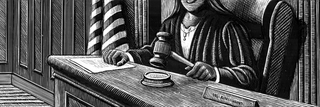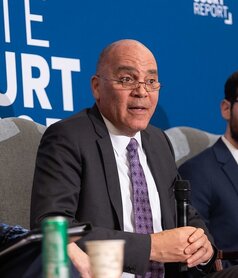
A Conversation with Former Texas Chief Justice Wallace B. Jefferson
Jefferson spoke about judicial independence, the under-funding of courts, and the need for greater access to counsel.
In February 2024, the Brennan Center for Justice, State Court Report, and the NYU Law Review hosted a symposium dedicated to state constitutional law. Several state supreme court justices who participated in the program sat down for brief interviews with State Court Report, which we are publishing as a series.
Wallace B. Jefferson served on the Texas Supreme Court from 2001 to 2013, and was chief justice from 2004 until the end of his tenure. In his interview, Jefferson addressed the under-funding of courts, judicial independence, the need for representation for undocumented people, and more. Jefferson serves on the State Court Report advisory board.
The following interview has been edited for length and clarity. Additional excerpts from Jefferson’s interview will be featured in later pieces.

What is something that people might not know about the Texas Constitution?
It was a constitution formed in reaction to Reconstruction. There are provisions that reflect that. It has the sort of grand ideas and the expansion of rights that many state constitutions do, and it has been amended many, many times. It is an ever-growing document, like many other state constitutions — but unlike the U.S. Constitution.
What are some of the decisions that you participated in that are most memorable to you?
Oh, that’s always a hard one. One fun one was a defamation case called New Times v. Isaacs. The question was, what role does parody play in a defamation action? The case originated from a story that a Dallas newspaper wrote about the district attorney in Dallas County. It was a parody making fun of or criticizing the DA’s prosecution history, depicting the prosecutor arresting a six-year-old girl and placing handcuffs on her. The question was, was that parody, or was that a potentially a viable cause of action under defamation laws? We held that it was pretty obvious parody. There were lots of clues that showed it was parody, and part of being a public figure is to accept the slings and arrows of public criticism like that.
What are some of the challenges that you see facing state courts, either in Texas or from a national perspective?
I think the biggest challenge is maintaining respect for the independence of the judicial branch and not being drawn into the political disputes that are plaguing the nation. I think these days you have people, including public officials, stating that they won’t follow precedent from the U.S. Supreme Court or criticizing courts in a way that’s over the top. If you lose that foundation — the foundation of an independent judiciary — that threatens the rest of our democracy. That’s the premier threat to the courts today.
Another big challenge has been around for some time: the under-funding of courts. It’s essential that the third branch has the resources to administer justice. If it doesn’t, people will lose the ability to vindicate their rights in court. You need proper funding to have high quality lawyers and law clerks. You need to pay the sorts of salaries that will keep qualified jurists on the bench. Many enormously talented judges have had to leave for financial reasons. The physical structure of courts and courtrooms matters, too. It impacts your ability to conduct trials. Courts need up-to-date technology. The state of Texas is growing faster than most, but the legislature is not keeping up. A lot of the funding is locally based, and some communities don’t have the resources to keep up with technology, case management systems, computers, and other innovations we need. If I were still chief, I would request funding to study artificial intelligence — both its promises and potential perils.
How can judges themselves help maintain respect for the independence of the judiciary?
The judiciary should, to the extent possible, stay out of the political fray. I would recommend that judges not be involved with advocacy groups. They need to be careful about giving speeches to advocacy groups. It’s not necessary to give those speeches. When you do it, it encourages the public to view you as a political actor rather than an impartial jurist. Judges should avoid engaging with obviously partisan interests.
What role do the legislature, executive branch, or lawyers have in helping separate politics from the courts?
Everyone should stop assuming that decisions are based on politics and not on the law or a statute or the Constitution. Journalists often write about the outcome of a case, but not the analysis and the reasoning. It’s unclear to me whether many of them read the opinions before they editorialize motivations for the outcome. And lawyers could do a better job defending courts. You know, the judges really don’t have an avenue for defending their own opinions of judgments and orders. So when there’s unfair criticism, I think the bar could step up and make it known that the opinion or order was what the law required. Congress should also do its best to depoliticize situations. Right now, confirmation hearings for federal judicial nominees devolve into very partisan talking points. That sort of dialogue makes it seem to the public that judges are captured by political interests, when very often they are not.
Does Texas have a lawyer shortage, either overall or in particular areas?
In Texas, we have a real problem with immigration and undocumented people who lack representation. The state and the federal government could do a better job providing lawyers to assist with those cases. That would not only help the client, but also the government in objectively and efficiently processing claims. We could use many more legal aid lawyers and offices, because the percentage of people who need access to basic civil legal services is a tiny fraction of those who are represented. Without legal assistance people lose their houses, lose their jobs, are separated from their families. And, of course, some people are wrongly incarcerated. Access to counsel is crucial for those people.
Erin Geiger Smith is a writer and editor at the Brennan Center for Justice.
Suggested Citation: Erin Geiger Smith, A Conversation with Former Texas Chief Justice Wallace B. Jefferson, Sᴛᴀᴛᴇ Cᴏᴜʀᴛ Rᴇᴘᴏʀᴛ (Apr. 22, 2024), https://statecourtreport.org/our-work/analysis-opinion/conversation-former-texas-chief-justice-wallace-b-jefferson.



Related Commentary
State Law Gives Litigators Extra Tools to Counter Originalism
Unique features of state courts allow lawyers to go beyond arguments available in federal courts.
The Diversity of Rights in State Constitutions
Transcript of panel from Symposium: The Power of State Constitutional Rights
A Conversation with Chief Judge Jeffrey S Sutton Court of Appeals for the Sixth Circuit
Transcript of panel from Symposium: The Power of State Constitutional Rights
Welcome
Transcript of panel from Symposium: The Power of State Constitutional Rights